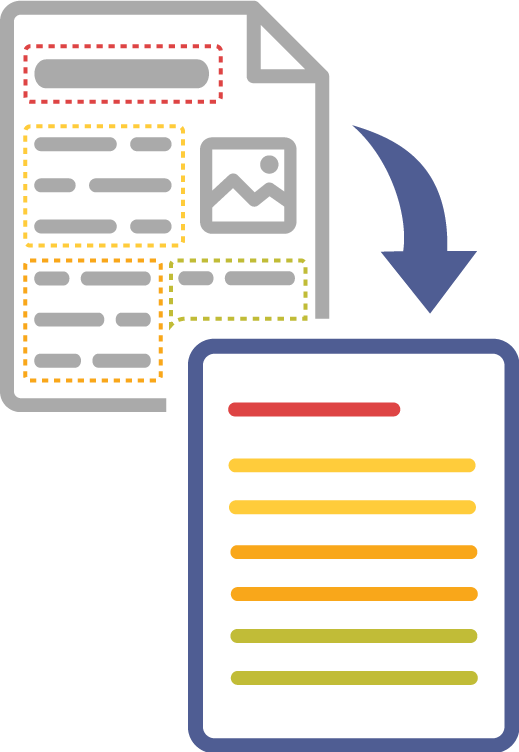
Fast and reliable OCR API based on Aspose.OCR for C++
Image to Text Recognition with Python OCR
More showcases >import asposeocr
settings = asposeocr.RecognitionSettings()
input_data = [asposeocr.AsposeOCRInput()]
input_data[0].url = 'path/to/file'
recognize_result = AsposeOCRRecognize(input_data, settings)
> pip install aspose-ocr-python-cpp
Why Choose Aspose.OCR for Python via C++?
Enhance your OCR capabilities with Aspose.OCR for Python via C++. This feature-packed library seamlessly integrates OCR into Python applications with minimal code. Experience exceptional speed and accuracy, supporting 140+ languages, including Latin, Cyrillic, Arabic, Persian, Indic, and Chinese scripts. Recognize a variety of images, from scanned documents and smartphone photos to screenshots and scanned PDFs. Advanced pre-processing filters handle challenges like rotated, skewed, and noisy images, ensuring optimal performance by leveraging GPU processing.

Swift and Precise OCR
Achieve rapid and accurate OCR results with cutting-edge Python via C++ technology.
Multilingual Recognition
Recognize text in more than 140 languages, ensuring versatility for Python applications via C++ integration.
Comprehensive Image Support
Effortlessly process images from scanners, cameras, and smartphones with Python via C++.
Accurate Chinese Character Recognition
Precisely recognize over 6,000 Chinese characters in your Python projects via C++.
Maintain Font Styles and Formatting
Preserve font styles and formatting for accurate representation of recognized text in your Python applications via C++.
Live code sample
Initiate text recognition from images in just three lines of code. Experience the simplicity!
* By uploading your files or using the service you agree with our Terms of use and Privacy Policy.
Convert image to text
More examples >// Initialize OCR engine
var recognitionEngine = new Aspose.OCR.AsposeOcr();
// Extract text from image
string result = recognitionEngine.RecognizeImage("<file name>");
// Display the recognition result
Console.WriteLine(result);
Choose your preference
Choose the right library for your needs. Explore available APIs and their capabilities to select the most efficient solution.
Versatility
Python via .NET
Uniformity
Python via Java
Performance
Python via C++
OCR Integration for Python Applications
Aspose.OCR for Python via C++ seamlessly integrates with any platform supporting C++ - whether on desktop Windows, Windows Server, macOS, Linux, or the cloud.







Supported file formats
Aspose.OCR for Python via C++ can work with any file you can get from a scanner or camera. Recognition results can be saved, imported to a database, or analyzed in real time.
Images
- JPEG
- PNG
- TIFF
- BMP
Batch OCR
- Multi-page PDF
- ZIP
- Folder
Recognition results
- Text
- Microsoft Word
- Microsoft Excel
- RTF
- JSON
- XML
Effortless Installation for Python via C++
Aspose.OCR for Python via C++ is delivered as a Python package or as a downloadable file with minimal dependencies. Easily install it into your project, and you’re ready to recognize texts in multiple supported languages and save recognition results in various formats.
Request a trial license to kickstart the development of a fully functional OCR application without limitations.
C++ Backend Integration for Python Applications
Our library seamlessly integrates with the C++ backend, enabling Python applications to run seamlessly on any platform – desktop Windows, Windows Server, macOS, Linux, and the cloud.
140+ Recognition Languages
Support for diverse languages and scripts, including mixed languages:
Optimize recognition by letting the library detect language or define it for improved performance.
- Extended Latin alphabet: English, Spanish, French, Indonesian, Portuguese, German, Vietnamese, Turkish, Italian, Polish, and 80+ more;
- Cyrillic alphabet: Russian, Ukrainian, Kazakh, Serbian, Belarusan, Bulgarian;
- Arabic, Persian, Urdu;
- Chinese and Devanagari script, including Hindi, Marathi, Bhojpuri, and others.
Key Features
Aspose.OCR for Python via C++ Explore advanced capabilities of Aspose.OCR for Python via C++.

Photo OCR
Extract text from smartphone photos with scan-level accuracy.

Searchable PDF
Convert any scan into a fully searchable and indexable document.

URL recognition
Recognize an image from URL without downloading it locally.

Bulk recognition
Read all images from multi-page documents, folders and archives.

Any font and style
Identify and recognize text in all popular typefaces and styles.

Fine-tune recognition
Adjust every OCR parameter for best recognition results.

Spell checker
Improve results by automatically correcting misspelled words.

Find text in images
Search for text or regular expression within a set of images.

Compare image texts
Compare texts on two images, regardless of the case and layout.

Limit recognition scope
Limit the set of characters the OCR engine will look for.

Detect image defects
Automatically find potentially problematic areas of image.

Recognize areas
Find and read only specific areas of an image, not all text.
Python Code Samples
Discover code samples to seamlessly integrate Aspose.OCR for Python via C++ into your applications.
Effortless Installation
Post-installation, promptly commence using Aspose.OCR for Python via C++, albeit with certain limitations. A temporary license removes all trial version restrictions for 30 days. Utilize this period to initiate the development of a fully functional OCR application, allowing you to make an informed decision on purchasing Aspose.OCR for Python via C++ later.
Document areas detection
An image scan or photograph of a text document often comprises multiple content blocks, including text paragraphs, tables, illustrations, formulas, and more. Successfully and accurately recognizing these areas of interest on a page is crucial for effective OCR. This pivotal process is known as document area detection, involving the identification, organization, and classification of distinct content regions.Aspose.OCR offers several document areas detection algorithms, allowing you to choose the one that works best for your specific content.
Setup for varuous image content - Python OCR
settings = asposeocr.RecognitionSettings()
settings.areasMode = asposeocr.DetectAreasMode.TABLE
# DetectAreasMode.DOCUMENT / PHOTO / CURVED_TEXT / TABLE / COMBINE
input_data = [asposeocr.AsposeOCRInput()]
input_data[0].url = 'path/to/file'
recognize_result = asposeocr.AsposeOCRRecognize(input_data, settings)
Various output formats
OCR for C++ can save recognition results in multiple formats so they can be shared, stored in a database, displayed, or analyzed: plain text, PDF, Microsoft Word, Microsoft Excel, JSON, and XML. {index-content-python-cpp.code_samples.item3.content2}
Save recognition results to JSON - Python
recognize_result_txt
= asposeocr.AsposeOCRSerializeResult(
recognize_result,
asposeocr.ExportFormat.json)


